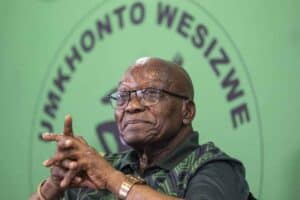The EFF leader says Motlanthe and Mbete were also elected through a secret ballot.

It is not for national speaker of parliament Baleka Mbete to argue on whether conducting a vote of no confidence in President Jacob Zuma through a secret ballot is “practicable”, says EFF leader Julius Malema.
The EFF leader has argued through his party’s court papers that an election conducted through a secret ballot was not “determinative of the outcome”, and did not stop the ANC from canvassing its members of parliament (MPs) to vote in favour of the president.
Also, Malema says ANC MPs are entitled to choose to follow “a party line”, as was demanded by ANC secretary-general Gwede Mantashe, who told ANC MPs not to vote with the opposition against Zuma and threatened punishment if they did.
In a court affidavit dated 13 April 2017, the EFF leader argued that Mbete, Zuma and former president Kgalema Motlanthe were elected through a secret ballot.
Link: EFF ConCourt Papers on the #NoConfidenceMotion & #SecreteBallot https://t.co/i8Fy6IE4DY
— Economic Freedom Fighters (@EFFSouthAfrica) April 19, 2017
“It is not the argument of the Speaker that it would not be practicable to conduct a secret ballot. However, I wish to point out that in the election of President Kgalema Motlanthe as President, on 25 September 2008, the Democratic Alliance proposed the name of Mr Joe Seremane. That necessitated a secret ballot by members of Parliament. The ANC did not oppose the ballot. Neither did the Speaker.
“In 2014, President Zuma was elected through a secret ballot, as the DA nominated its own candidate.
“The current speaker of national parliament [Baleka Mbete], who is the first respondent on these proceedings, was elected through a secret ballot.”
This comes after Mbete argued – through court papers, on Tuesday – that she was not opposed to the idea of conducting the votes through a secret ballot.
“I am, however, bound by the constitution and the rules that the NA [National Assembly] has adopted”.
She added that she had no “authority or discretion to accede to the Applicant’s request”.
United Democratic Movement leader Bantu Holomisa, an applicant in this case, was recently given an opportunity by the Constitutional Court to argue in court why MPs should be allowed to cast their ballots secretly during the vote of no confidence in the president.






